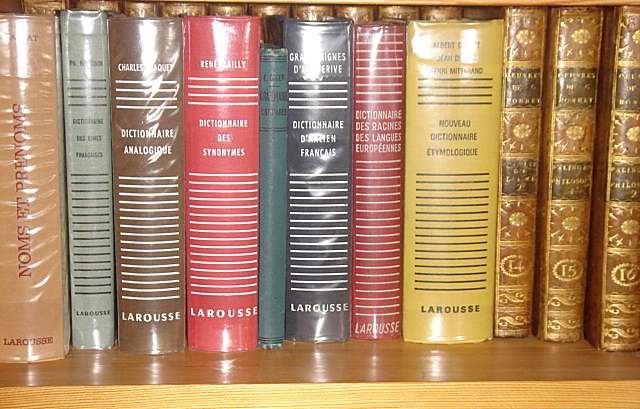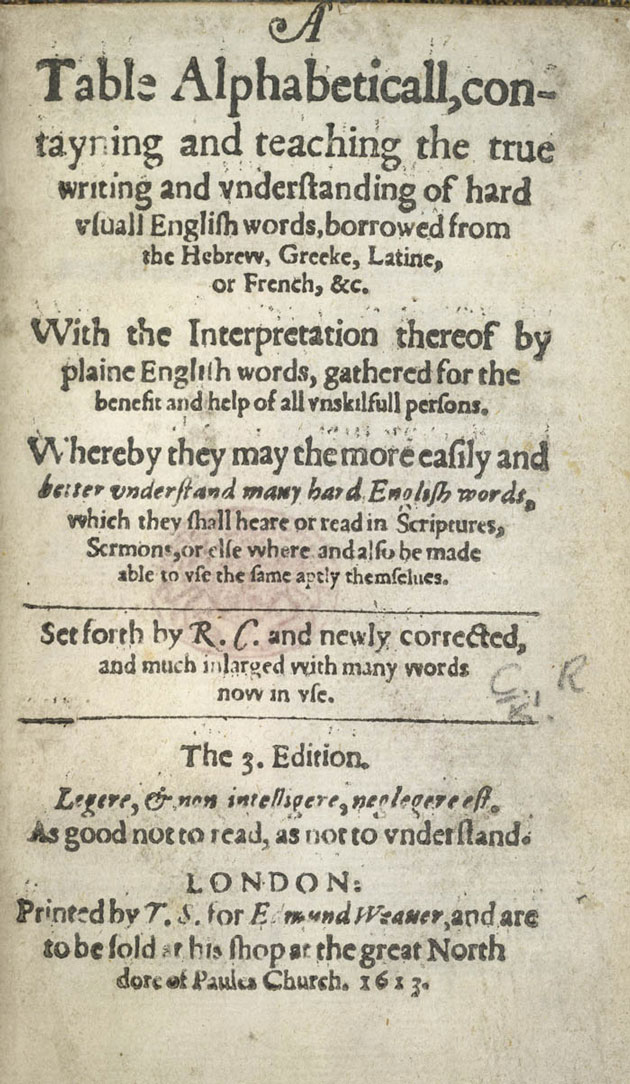|
Dictionaries
A dictionary is a listing of lexemes from the lexicon of one or more specific languages, often arranged Alphabetical order, alphabetically (or by Semitic root, consonantal root for Semitic languages or radical-and-stroke sorting, radical and stroke for Logogram, logographic languages), which may include information on definitions, usage, etymologies, pronunciations, Bilingual dictionary, translation, etc.Webster's New World College Dictionary, Fourth Edition, 2002 It is a Lexicography, lexicographical reference that shows inter-relationships among the data. A broad distinction is made between general and specialized dictionaries. Specialized dictionaries include words in specialist fields, rather than a comprehensive range of words in the language. Lexical items that describe concepts in specific fields are usually called terms instead of words, although there is no consensus whether lexicology and terminology are two different fields of study. In theory, general dictionarie ... [...More Info...] [...Related Items...] OR: [Wikipedia] [Google] [Baidu] |
Chinese Dictionary
There are two types of dictionaries regularly used in the Chinese language: list individual Chinese characters, and list words and phrases. Because tens of thousands of characters have been used in written Chinese, Chinese lexicographers have developed a number of methods to order and sort characters to facilitate more convenient reference. Chinese dictionaries have been published for over two millennia, beginning in the Han dynasty. This is the longest lexicographical history of any language. In addition to works for Mandarin Chinese, beginning with the 1st-century CE '' Fangyan'' dictionaries also been created for the many varieties of Chinese. One of the most influential Chinese dictionaries ever published was the '' Kangxi Dictionary'', finished in 1716 during the Qing dynasty, with the list of 214 Kangxi radicals it popularized are still widely used. Terminology The general term ''cishu'' ( zh, links=no, t=辭書, p=císhū, l=lexicographic books) semantically encompasse ... [...More Info...] [...Related Items...] OR: [Wikipedia] [Google] [Baidu] |
Bilingual Dictionary
A bilingual dictionary or translation dictionary is a specialized dictionary used to Translation, translate Word (linguistics), words or phrases from one language to another. Bilingual dictionaries can be ''unidirectional'', meaning that they list the meanings of words of one language in another, or can be ''wikt:bidirectional, bidirectional'', allowing translation to and from both languages. Bidirectional bilingual dictionaries usually consist of two sections, each listing words and phrases of one language along with their translation. In addition to the translation, a bilingual dictionary usually indicates the lexical category, part of speech, grammatical gender, gender, grammatical conjugation, verb type, declension, declension model and other grammatical clues to help a foreign language, non-native speaker use the word. Other features sometimes present in bilingual dictionaries are lists of phrases, usage and style guides, verb tables, maps and grammar references. In contrast to ... [...More Info...] [...Related Items...] OR: [Wikipedia] [Google] [Baidu] |
Lexicography
Lexicography is the study of lexicons and the art of compiling dictionaries. It is divided into two separate academic disciplines: * Practical lexicography is the art or craft of compiling, writing and editing dictionaries. * Theoretical lexicography is the scholarly study of semantic, orthography, orthographic, syntagma (linguistics), syntagmatic and paradigmatic features of lexemes of the lexicon (vocabulary) of a language, developing theories of dictionary components and structures linking the data in dictionaries, the needs for information by users in specific types of situations, and how users may best access the data incorporated in printed and Electronic dictionary, electronic dictionaries. This is sometimes referred to as "metalexicography". There is some disagreement on the definition of lexicology, as distinct from lexicography. Some use "lexicology" as a synonym for theoretical lexicography; others use it to mean a branch of linguistics pertaining to the inventor ... [...More Info...] [...Related Items...] OR: [Wikipedia] [Google] [Baidu] |
Specialized Dictionaries
A specialized dictionary is a dictionary that covers a relatively restricted set of phenomena. The definitive book on the subject (Cowie 2009) includes chapters on some of the dictionaries included below: *synonyms *pronunciations *names (place names and personal names) *phrases and idioms *dialect terms *slang *quotations *etymologies *rhymes *lyrics Dictionaries of idioms and slang are common in most cultures. Examples include (of French) the ''Dictionnaire des expressions et locutions'', edited by Alain Rey (Paris: Le Robert 2006), and (of English) Eric Partridge's ''Dictionary of Slang and Unconventional English'' (8th edition, London: Routledge 2002). In the area of language learning, there are specialized dictionaries for aspects of language which tend to be ordinary for mother-tongue speakers but may cause difficulty for learners. These include dictionaries of phrasal verbs, such as the ''Oxford Phrasal Verbs Dictionary'' (2nd edition, Oxford University Press: 2006), and ... [...More Info...] [...Related Items...] OR: [Wikipedia] [Google] [Baidu] |
Thesaurus
A thesaurus (: thesauri or thesauruses), sometimes called a synonym dictionary or dictionary of synonyms, is a reference work which arranges words by their meanings (or in simpler terms, a book where one can find different words with similar meanings to other words), sometimes as a hierarchy of broader and narrower terms, sometimes simply as lists of synonyms and antonyms. They are often used by writers to help find the best word to express an idea: Synonym dictionaries have a long history. The word 'thesaurus' was used in 1852 by Peter Mark Roget for his ''Roget's Thesaurus''. While some works called "thesauri", such as ''Roget's Thesaurus'', group words in a hierarchical hypernymic taxonomy of concepts, others are organised alphabetically or in some other way. Most thesauri do not include definitions, but many dictionaries include listings of synonyms. Some thesauri and dictionary synonym notes characterise the distinctions between similar words, with notes on their " ... [...More Info...] [...Related Items...] OR: [Wikipedia] [Google] [Baidu] |
Radical-and-stroke Sorting
Collation is the assembly of written information into a standard order. Many systems of collation are based on numerical order or alphabetical order, or extensions and combinations thereof. Collation is a fundamental element of most office filing systems, library catalogs, and reference books. Collation differs from ''classification'' in that the classes themselves are not necessarily ordered. However, even if the order of the classes is irrelevant, the identifiers of the classes may be members of an ordered set, allowing a sorting algorithm to arrange the items by class. Formally speaking, a collation method typically defines a total order on a set of possible identifiers, called sort keys, which consequently produces a total preorder on the set of items of information (items with the same identifier are not placed in any defined order). A collation algorithm such as the Unicode collation algorithm defines an order through the process of comparing two given character st ... [...More Info...] [...Related Items...] OR: [Wikipedia] [Google] [Baidu] |
Prescription And Description
Linguistic prescription is the establishment of rules defining publicly preferred Usage (language), usage of language, including rules of spelling, pronunciation, vocabulary, grammar, etc. Linguistic prescriptivism may aim to establish a standard language, teach what a particular society or sector of a society perceives as a correct or proper form, or advise on effective and stylistically apt communication. If usage preferences are conservative, prescription might appear resistant to language change; if radical, it may produce neologisms. Such prescriptions may be motivated by consistency (making a language simpler or more logical); rhetorical effectiveness; tradition; aesthetics or personal preferences; linguistic purism or nationalism (i.e. removing foreign influences); or to avoid causing offense (etiquette or political correctness). Prescriptive approaches to language are often contrasted with the Linguistic description, descriptive approach of Linguistics, academic linguistic ... [...More Info...] [...Related Items...] OR: [Wikipedia] [Google] [Baidu] |
Rhyming
A rhyme is a repetition of similar sounds (usually the exact same phonemes) in the final stressed syllables and any following syllables of two or more words. Most often, this kind of rhyming (''perfect rhyming'') is consciously used for a musical or aesthetic effect in the final position of lines within poems or songs. More broadly, a rhyme may also variously refer to other types of similar sounds near the ends of two or more words. Furthermore, the word ''rhyme'' has come to be sometimes used as a shorthand term for any brief poem, such as a nursery rhyme or Balliol rhyme. Etymology The word derives from or , which might be derived from , a Germanic term meaning "series", or "sequence" attested in Old English (Old English: meaning "enumeration", series", or "numeral") and , ultimately cognate to , ( "number"). Alternatively, the Old French words may derive from , from (, rhythm). The spelling ''rhyme'' (from the original rime) was introduced at the beginning of the Mod ... [...More Info...] [...Related Items...] OR: [Wikipedia] [Google] [Baidu] |
Synonym
A synonym is a word, morpheme, or phrase that means precisely or nearly the same as another word, morpheme, or phrase in a given language. For example, in the English language, the words ''begin'', ''start'', ''commence'', and ''initiate'' are all synonyms of one another: they are ''synonymous''. The standard test for synonymy is substitution: one form can be replaced by another in a sentence without changing its meaning. Words may often be synonymous in only one particular sense: for example, ''long'' and ''extended'' in the context ''long time'' or ''extended time'' are synonymous, but ''long'' cannot be used in the phrase ''extended family''. Synonyms with exactly the same meaning share a seme or denotational sememe, whereas those with inexactly similar meanings share a broader denotational or connotational sememe and thus overlap within a semantic field. The former are sometimes called cognitive synonyms and the latter, near-synonyms, plesionyms or poecilonyms. Lexic ... [...More Info...] [...Related Items...] OR: [Wikipedia] [Google] [Baidu] |
Table Alphabeticall
''A Table Alphabeticall'' is the abbreviated title of the first monolingual dictionary in the English language, created by Robert Cawdrey and first published in London in 1604. The work is notable for being the first collection of its kind. At only 120 pages, it listed a total of 2,543 words accompanied by very brief (often single-word) definitions. In most cases, it was little more than a list of synonyms. The words chosen by Cawdrey might seem arbitrary and obscure, yet the purpose was for understanding uncommon words which were circulating due to the advent of the printing press, and the English language Bible. The dictionary's claimed purpose was "for the benefit and help of unskillful persons". Within a few decades, many other English dictionaries followed. Details ''A Table Alphabeticall'' was published in London. The 1604 edition was printed by "I. R." (I. Roberts) for Edmund Weaver (listed as "Edmund Weauer"). The books are marked with a note that they "are to be sol ... [...More Info...] [...Related Items...] OR: [Wikipedia] [Google] [Baidu] |



